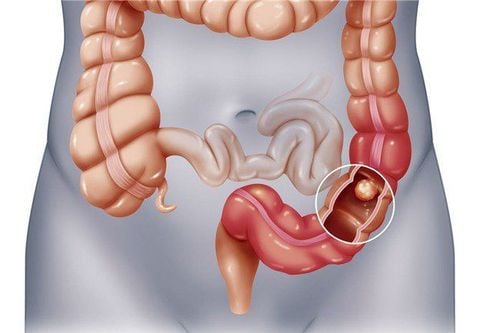This is an automatically translated article.
The article is expertly consulted by Master, Doctor Truong Thanh Tam - Pediatrician - Pediatrics - Neonatology - Vinmec Danang International General Hospital. Dr. Tam has 15 years of experience working in the field of Pediatrics.Gardner syndrome is an inherited disease that is a subtype of familial adenomatous polyposis. Gardner syndrome is associated with multiple colonic neoplasms with sebaceous cysts and osteomas of the jaw.
1. What is Gardner syndrome?
Gardner syndrome is a subtype of familial adenomatous polyposis syndrome. Is a combination of multiple colonic tumors with sebaceous cysts and osteomas of the jaw. In people with Gardner syndrome, masses of noncancerous tissue tend to form in many different organs, such as:Colon: A polypoid adenoma, which is an area of normal cells that lines the inside of the colon and begins to form. The head causes mucus to build up in a mass inside the lumen of the colonic canal. Benign tumors such as: Sebaceous cysts, epidermoid cysts, fibroids, sclerotic tumours, bone tumors. People with Gardner syndrome have an increased risk of developing colorectal cancer and other cancers associated with familial adenomatous polyposis. Gardner syndrome is quite rare, caused by an autosomal dominant chromosome inherited from parents. In which the mutation occurs in only one copy of the gene. This means that one parent with the mutated gene can pass on one copy of the normal gene or one copy of the mutated gene. Thus, a child whose parents have the mutated gene has a 50% chance of inheriting the mutation, or a sibling or parent of someone with the mutated gene also has a 50% chance of having the mutation. the same, similar.

Hội chứng Gardner là một kiểu phụ của hội chứng đa polyp tuyến có tính gia đình, u đại tràng là u thường thấy ở hội chứng này
2. Causes of Gardner's Syndrome
Gardner syndrome is an inherited disease, so it can be passed down from generation to generation in the family. The APC gene is associated with Gardner syndrome which is abbreviated as adenomatous polyposis coli. Mutations in the APC gene put a person at increased risk of developing polyps, benign tumors, and cancer.3. Diagnosis of Gardner's syndrome
A person with multiple adenomas and/or colorectal cancer along with several of the benign tumors listed above is suspected of having Gardner syndrome. People suspected of having Gardner syndrome may have blood tests done to look for the mutated APC gene. If a mutated APC gene is found, other family members may also be diagnosed with Gardner syndrome if they are tested and have the same gene mutation.People with Gardner syndrome have a fairly high risk of cancer, especially colorectal cancer, if left untreated. Therefore, screening for Gardner syndrome is important, considering the same as screening for familial adenomatous polyposis (FAP), with the addition of frequent skin examinations. It is important to discuss with your doctor how to perform screening tests, each individual is different. Familial adenomatous polyposis (FAP) screening includes:
Annual screening for hepatoblastoma, children at risk from birth to 5 years of age, including physical examination, ultrasound abdomen, and a blood count to measure alpha-fetoprotein (AFP) levels. Annual flexible sigmoidoscopy, beginning between the ages of 10 and 12, for children at risk for familial adenomatous polyposis (FAP). Colonoscopy once a tumor (polyp) is detected; For individuals with familial adenomatous polyposis (FAP) a colectomy, surgical removal of the entire colon at some point due to the number of polyps and the risk of colorectal cancer ca. Gastrointestinal endoscopy every 3 years, starting at age 25 or after polyps are discovered. X-ray or CT scan or CAT scan of the small intestine: if adenoma is found on upper gastrointestinal endoscopy or before a colectomy (surgical removal of the entire colon), repeat every 1-3 once a year depending on the symptoms. Annual general checkup including thyroid exam. Visit a dermatology yearly or more often as needed. In addition, screening tests may change over time as new technology develops and Gardner syndrome is better known. Your doctor will advise on appropriate screening tests.

Những người mắc hội chứng Gardner có nguy cơ mắc ung thư khá cao
Vinmec International General Hospital with a system of modern facilities, medical equipment and a team of experts and doctors with many years of experience in medical examination and treatment, patients can rest assured to visit. Gardner syndrome examination and treatment at the Hospital.
Please dial HOTLINE for more information or register for an appointment HERE. Download MyVinmec app to make appointments faster and to manage your bookings easily.
SEE MOREWhat is colorectal cancer screening? Treatment methods for colorectal cancer Nutrition for patients with colorectal cancer














